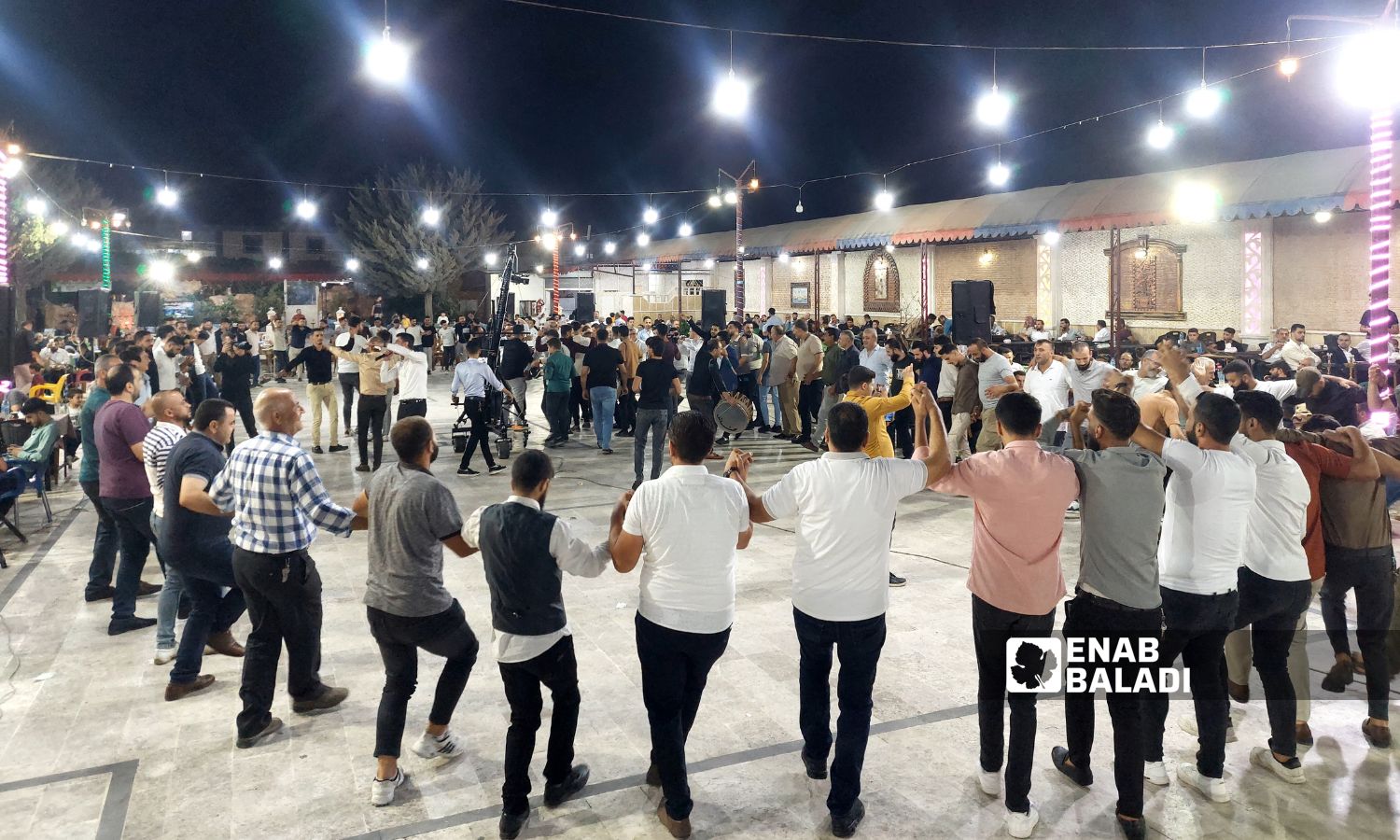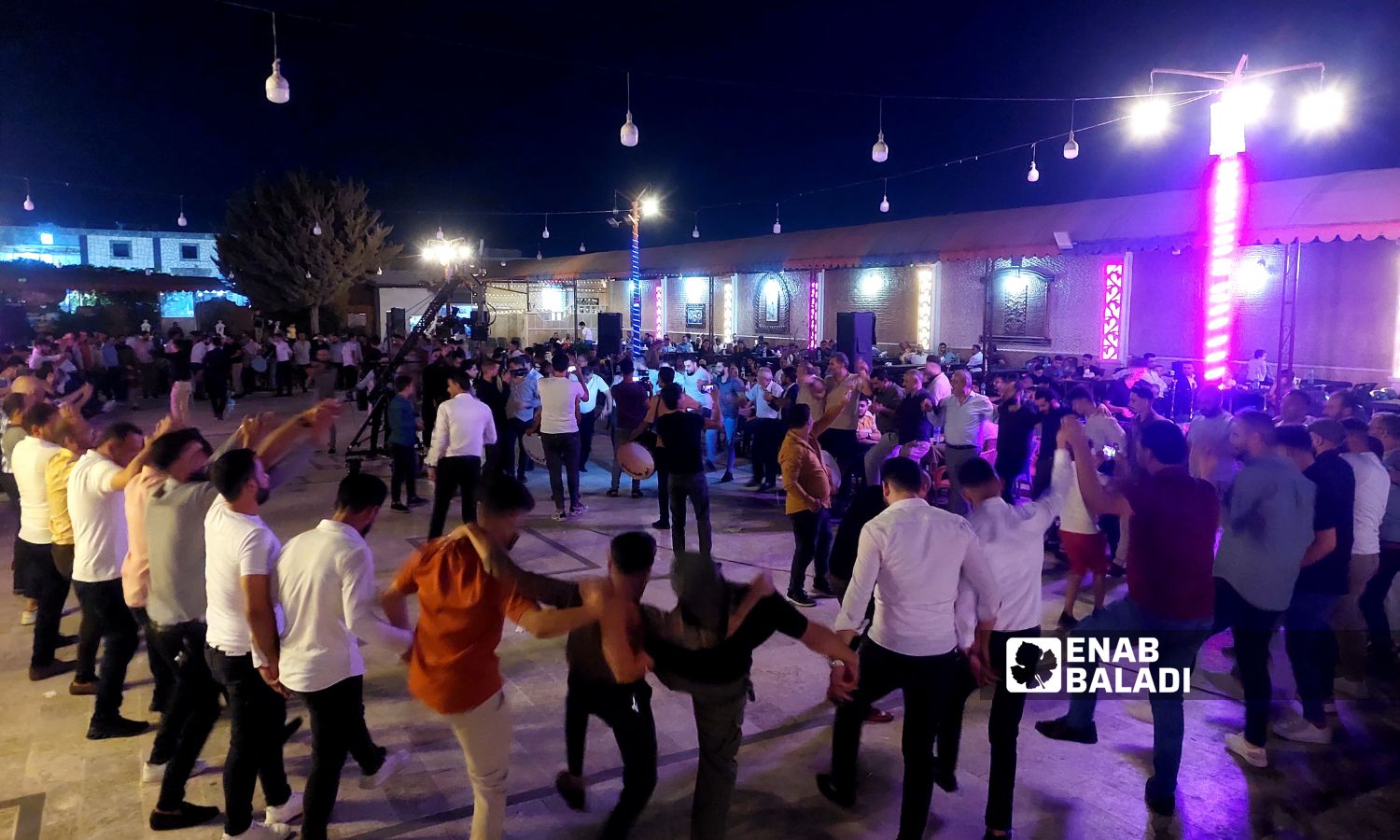



Enab Baladi – Hassan Ibrahim
With the sound of the rababah and Saraqibian ballads, the wedding of the young man Mahmoud, displaced from Saraqib to Idlib city, began. A local singer then started to sing traditional rural songs, accompanied by drum beats, initiating a senior dance (Dabke Arab), creating a joyous atmosphere that reminded attendees of the joy that the war had failed to erase.
In mid-August of this year, the young man’s family held their son’s wedding in a hall in Idlib city, enlivened by a local singer. The celebration lasted about four hours and started with a traditional arada dance, followed by folk songs and dances. The groom’s brother described the event as “having traditions and being far from childish atmospheres.”
Khalid, the groom’s brother, told Enab Baladi that the wedding was an opportunity to overcome the circumstances of displacement, suffering, and misery in the region. He added that people have the right to feel happy in their most depressing circumstances, seeing it as a chance to revive traditions and recall the festive customs of Saraqib, from which they were displaced in 2019.
Despite having arada and sword and shield dance, the young man said the wedding would not be complete without the rababeh and drum, a customary ritual in Saraqib. When the singer starts to sing, the seniors typically come to the center of the hall and begin the Dabke Arab dance, followed by the youth with the Walda Dabke and Fast Dabke.
The guests did not shoot into the air to avoid causing disturbance and out of respect for the region’s circumstances, according to Khalid. He added that the wedding included refreshments of sweets, fruits, and bitter coffee. He noted that it is customary, according to the means available, for families to offer sweets, fruits, bitter coffee, tea, or soft drinks.
The young man’s wedding represents the popular celebrations active in northern Syria, home to about 5.1 million people. It breaks the mountain of worries accumulated by years of war in people’s hearts and creates a joyful, intimate, and happy atmosphere, even if temporarily, leaving happy moments engraved in people’s memories.
“We need to forget life’s worries for a while; if we don’t celebrate and dance at weddings, when will we?”
Young man Ghazwan insisted on holding his wedding with folk songs, using sound systems and enthusiastic interjections from a relative holding a microphone. This was his way of creating a festive atmosphere and breaking the wall of worries that constantly occupied his mind, as his displacement to eastern Idlib’s countryside was exhausting.
The young man told Enab Baladi that holding a “simple” wedding with modest capabilities is not problematic, experiencing hours of joy with family and relatives. It has become rare to have happy occasions that gather families, at least different from gatherings during funerals and burials, which have been frequent since the displacement in 2019.
Though a year has passed since the young man’s wedding, the memories of the event remain in the minds of the family and relatives, saved on phone devices, watched from time to time, recalling the intimacy, love, and dabke rituals.
The young man added that “the wedding was modest,” held in the courtyard of the bride’s family’s home. His relative took the singer’s place and enlivened the atmosphere. The celebration included some dances, with the dabke, known as an essential ritual with sequential steps and regular foot strikes on the ground. It lasted about four hours and ended with a procession to his equipped tent near Maarat Misrin.

Popular celebrations thrive in northern Syria and create joyful atmosphere – August 22, 2024 (Enab Baladi)
Some families resort to large places like special playgrounds or swimming pools and parks to accommodate the largest number of people, considering them as open-air venues that can be rented for hours, equating in cost, after preparations, to the cost of private halls.
In October 2023, the family of young Hassan Hamidan held a wedding for their son in Idlib city inside a swimming pool that served as a hall. The wedding took place with the attendance of dozens of relatives and friends.
The young man told Enab Baladi that the wedding was modest, unlike what his family was accustomed to when they held weddings for his two older brothers years ago. However, the wedding, with sound and photography equipment, was an opportunity for joy and celebration for his family, especially since he is the youngest, and for his relatives and friends.
He explained that the ceremony witnessed the revival of the “Qiuser” or “Kings” dance, a dance for the elders and “kabbariyeh,” involving no arbitrary movements but movements of “pride” and the stretching and shortening leg movements, in addition to dabke and traditional Arabic dances.
The young man mentioned that the wedding was held at the insistence of his father and friends, as a celebration couldn’t pass without a party. The event included the performance of folk songs far from inferior songs, according to him.
According to Enab Baladi‘s observation of singers’ fees in northern Syria, they range from 300 USD (about 10,000 Turkish lira) to 700 USD (1 USD equals 15,000 Syrian pound and 33 Turkish lira).
On August 22 of this year, young man Mohammad Bakkar held his wedding in Azaz city in northern rural Aleppo. He told Enab Baladi that he contacted a folk singer for the celebration, considering that the wedding is a one-time and unique joy that will not be repeated.
He mentioned that the fees are not fixed and can be adjusted, depending on the young man’s financial capability. The men’s wedding hall costs 300 USD, the singer’s fee is 350 USD, the photographer’s fee is 350 USD (video and photos), and the arada group’s fee is 200 USD.
Additionally, the women’s hall costs 200 USD, the DJ music fee is 150 USD, and the female photographer’s fee is 150 USD, plus the cost of hospitality, which varies by type.
The costs are high compared to the living and economic situation, as the daily wage for a worker does not exceed three dollars. However, the celebration often includes monetary gifts or presents (such as sacrifices) from some guests. Some also bring “showbash” (money offered by some guests and mentioned by the singer during the party).
According to Enab Baladi‘s observation, some families have reservations about holding celebrations with a singer, or at least avoid publicizing them live until they are over, fearing conflicts with some factions or elements for religious reasons, particularly in Idlib.
The customs and traditions of celebrations vary across Syrian regions but have come together in the northwest after multiple displacements and relocations. Weddings for people from Idlib or northern Aleppo now feature Damascus or Homs arada dances.
Arabic majlis with coffee pots in the center have spread during wedding feasts or marriage contracts, traditions brought by the displaced to northwestern Syria.
The Syrian people’s tastes in singing and chanting vary according to regional customs in hosting celebrations, ranging from authentic singing to fast chanting and dancing.
Typically, chanting groups consist of a head who trains members on chanting and musical scales, a deputy, a choral group, a rhythm controller, and musicians.
Some families bring arada groups, specialized in dancing, distinguished by their uniform attire, performing dances in front of the chanting groups in the center of the celebration.
During the 20th century, Syria was known for dozens of renowned religious chanters who gained wide fame and whose names became associated with Ramadan. These include Tawfiq al-Munajjid, Hamza Shakkur, Suleiman Dawood, and Mohammad al-Hakim.
if you think the article contain wrong information or you have additional details Send Correction